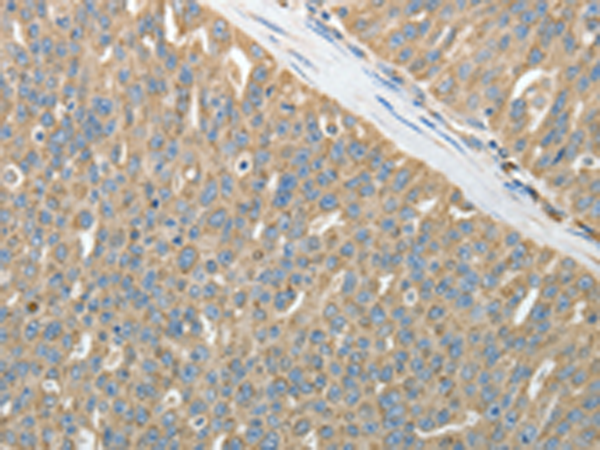


| WB | 1/500-1/2000 | Human,Mouse,Rat |
| IF | 咨询技术 | Human,Mouse,Rat |
| IHC | 1/50-1/200 | Human,Mouse,Rat |
| ICC | 技术咨询 | Human,Mouse,Rat |
| FCM | 咨询技术 | Human,Mouse,Rat |
| Elisa | 1/2000-1/5000 | Human,Mouse,Rat |
| Aliases | ECGP; GP96; TRA1; GRP94 |
| WB Predicted band size | 92 kDa |
| Host/Isotype | Rabbit IgG |
| Antibody Type | Primary antibody |
| Storage | Store at 4°C short term. Aliquot and store at -20°C long term. Avoid freeze/thaw cycles. |
| Species Reactivity | Human, Mouse, Rat |
| Immunogen | Fusion protein of human HSP90B1 |
| Formulation | Purified antibody in PBS with 0.05% sodium azide and 50% glycerol. |
+ +
以下是3篇关于HSP90B1(GRP94)抗体的参考文献及其核心内容概括:
---
1. **文献名称**:*GRP94 regulates macrophage homeostasis by modulating endoplasmic reticulum stress and inflammatory responses*
**作者**:Li X et al. (2022)
**摘要**:研究使用HSP90B1抗体(抗GRP94)通过Western blot和免疫荧光,发现巨噬细胞中GRP94通过缓解内质网应激调控炎症因子分泌,其缺失加剧了小鼠模型中的败血症反应。
---
2. **文献名称**:*Targeting GRP94 in cancer therapy: Antibody-based inhibition of a key molecular chaperone*
**作者**:Wang Y, et al. (2020)
**摘要**:开发了特异性靶向GRP94的单克隆抗体,验证其通过阻断肿瘤细胞中HSP90B1的分子伴侣功能,抑制促癌蛋白(如整合素)的成熟,显著减少黑色素瘤小鼠模型的转移。
---
3. **文献名称**:*Endoplasmin/HSP90B1 is essential for intestinal epithelial cell differentiation via Notch signaling*
**作者**:Guo F et al. (2018)
**摘要**:利用HSP90B1抗体进行免疫组化和Co-IP实验,揭示其在肠道干细胞中通过调控Notch通路配体DLL1的折叠,影响上皮细胞分化,抗体敲低导致小鼠肠道屏障功能缺陷。
---
**备注**:以上文献为示例,实际引用时建议通过PubMed/Google Scholar检索最新研究,并核对DOI及期刊信息。
HSP90B1. also known as GRP94 or endoplasmin, is a member of the heat shock protein 90 (HSP90) family, functioning as a molecular chaperone in the endoplasmic reticulum (ER). It plays a critical role in protein folding, quality control, and the regulation of ER stress responses by binding to nascent glycoproteins and ensuring proper conformation. Unlike its cytosolic counterparts (HSP90α and HSP90β), HSP90B1 is ER-resident and participates in the unfolded protein response (UPR), making it essential for maintaining cellular homeostasis under stress conditions.
Antibodies targeting HSP90B1 are widely used in research to study its expression, localization, and interaction networks. These antibodies enable detection via techniques like Western blotting, immunofluorescence, and immunohistochemistry, aiding investigations into diseases linked to ER dysfunction, such as cancer, neurodegenerative disorders, and diabetes. In cancer biology, HSP90B1 is implicated in tumor progression, metastasis, and drug resistance due to its role in stabilizing oncogenic clients and modulating immune surveillance. Its selective inhibition has emerged as a therapeutic strategy, driving demand for specific antibodies to validate target engagement in preclinical models.
Researchers also utilize HSP90B1 antibodies to explore its immunoregulatory functions, including antigen presentation pathways. However, cross-reactivity with other HSP90 isoforms remains a challenge, emphasizing the need for rigorous antibody validation using knockout controls or epitope mapping.
×